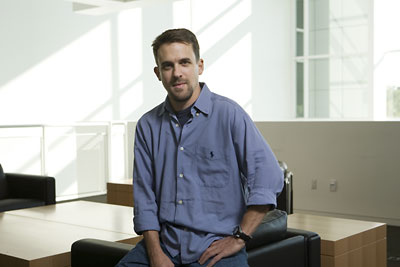Tisch gift gives Cornell an edge in 'ferocious' competition to recruit and retain top faculty
By Susan S. Lang
As Cornell braces itself for the retirement of about one-third of its faculty in the next 10 years or so, recruitment is a top priority. So, too, are efforts to improve quality of life on campus and in Ithaca and to help retain the top-notch faculty already on board as other schools try to woo them away.
"The competition is ferocious," said David Harris, Cornell interim provost. So news of the recent Tisch University Professorships gift came as a welcome relief. The pressure is greater than ever because Cornell is seeking to enhance its faculty ranks in such areas as the life sciences at a time when the cohort of baby-boomers, hired 30 to 40 years ago, are creating a swell of retirements that has already begun.

Thus, faculty hires are up: For the past three years, Cornell has hired an average of 82 new faculty members, up from 63 new faculty hires 15 years ago. "This hiring bulge presents additional challenges in hiring top-rate faculty," said Harris.
One strategy to ensure that Cornell gets exceptional researchers when they become available is by "prefilling" a position several years before an anticipated retirement, even though that means the university must support two researchers during the overlap period.
Another strategy is to make Cornell an attractive place to work with its programs that help with housing, child care and dual-career issues to not only attract new faculty but also to meet the ongoing needs of current faculty members.
Dual-career issues, said William Fry, dean of the university faculty, is a tremendous challenge: Increasingly, prospective faculty members will only accept positions if their often highly qualified partners can find an appropriate job in the area.
"More and more, we're competing for dual-career couples, but Ithaca is a small place," said Fry. "It's harder for us because we have to compete with [institutions] in such metropolitan areas as Boston, New York, Atlanta and Houston. We have to make Cornell more attractive in other ways."

These are all areas where the Tisch gift could make a dramatic difference. "Additional financial resources will help us remain competitive as we refine our recruitment, retention and tenure processes," said Harris. But Cornell must also improve its faculty mentoring programs and departmental climates, he said. One notable effort already under way is the CU-ADVANCE Center, a National Science Foundation-funded initiative to help recruit and retain more women faculty in the traditionally male-dominated engineering and science disciplines.
"Our faculty is the primary resource on which the future of the university relies, and retaining superb individuals is one of our highest priorities," said Kent Fuchs, dean of the College of Engineering. "This gift provides the funding and prestige to recognize and appropriately reward our world-class faculty."
Perhaps no department knows the challenge of faculty recruitment and retention better these days than chemistry. In the past four years, the department has lost one quarter of its faculty to retirements or to other institutions. Although six new faculty members have come on board recently, there are still eight positions to fill.
One problem is that the cost to set a professor up with a laboratory "has gone up tremendously," said Barbara Baird, chair of the chemistry department. Start-up packages in chemistry can cost hundreds of thousands of dollars. Cornell must also bear the cost of bringing a laboratory up to speed in such old buildings as Baker Laboratory and ST Olin Chemistry Research Building -- built in 1924 and 1967, respectively. "The cost of renovation is real issue," said Baird.
Media Contact
Get Cornell news delivered right to your inbox.
Subscribe